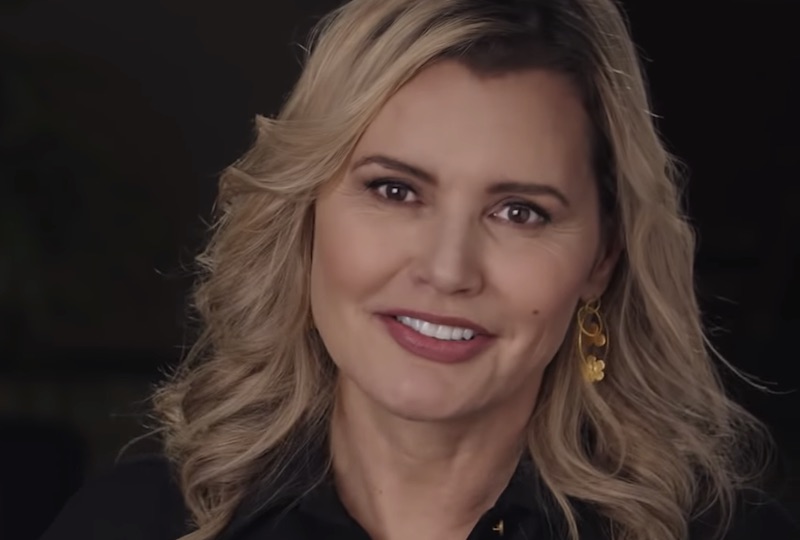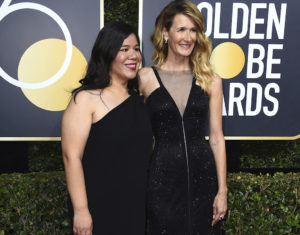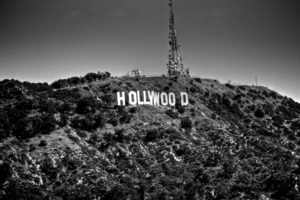Geena Davis Puts a Sexist Hollywood on Notice
In "This Changes Everything," Davis and peers like Kimberly Peirce, Meryl Streep and Taraji P. Henson zoom in on their industry's gender gap. Geena Davis appears in a still image from "This Changes Everything." (YouTube)
Geena Davis appears in a still image from "This Changes Everything." (YouTube)
Shortly after “Thelma & Louise” was released in 1991 and quickly became a far bigger deal than anyone involved in the film had imagined it would, Geena Davis started hearing the same refrain over and over: “This changes everything.” In other words, the cinematic glass ceiling had been smashed, and women in Hollywood were finally going to get their due, both in front of and behind the camera.
Guess again. Ridley Scott’s modestly budgeted feature about two best friends’ spontaneous bid to break free from lives stifled by noxious men was a bona fide cultural phenomenon, sparking debates among the commentariat, galvanizing and polarizing audiences in strong numbers, and picking up heat in that year’s awards circuit. Much more than just A Buddy Movie for The Ladies, “Thelma & Louise” rose to iconic status, thanks in no small part to Davis’ and co-star Susan Sarandon’s gobsmacking turns as unlikely feminist vigilantes road-tripping their way through 130 minutes of the most unsettling, unapologetic rebuke of patriarchal control to hit the local multiplex. Still, it’s not exactly a spoiler by now that all that buzz and applause didn’t cause a meaningful shift to happen for women, even in the supposedly liberal bubble of Hollywood.
Nearly three decades later, Davis has a much better grasp on why “Thelma & Louise” didn’t really change everything. Nor did “A League of Their Own,” “Boys Don’t Cry,” “Daughters of the Dust,” or a litany of other films about women, directed by women, taking women seriously as cultural producers and as the subjects of stories worth telling. She also has the hard data, pulled from studies conducted at the Geena Davis Institute on Gender in Media, to help her colleagues grasp how the prevailing sense that gender bias is a thing of the past in their industry is dead wrong.
All the better to speak their language, and Davis is doing just that as the executive producer of a new documentary called “This Changes Everything,” in which she and a host of women — including actors Natalie Portman, Tiffany Haddish, Sandra Oh, Jessica Chastain, Meryl Streep, and Taraji P. Henson and directors Kimberly Peirce, Julie Dash and Catherine Hardwicke — make their case for closing the vast gender gap in the movie business. Among the many forms of bias the documentary covers, it also schools viewers about how, historically, female directors weren’t always the tiny minority they are now, a topic taken up by Truthdig contributor Carrie Rickey in her vital five-part series. That Kathryn Bigelow is still the only woman to win the Academy Award for Best Director, and that happened nearly a decade ago, is just one indication that it’s well past time to stage an intervention.
That’s where Davis comes in. At a recent screening in Hollywood of “This Changes Everything,” she told the audience at a panel assembled by the Los Angeles Press Club that she chalked some of the problem up to unintentional ignorance, since data about on-screen representations of women, for example, hadn’t previously been so closely tracked and reported. Davis recalled early conversations with colleagues in which, “Every single one of them said, no no no, that’s not a problem anymore — that’s been fixed! And most often they would name a movie with one female character as proof that gender [inequality] was over … I couldn’t find one human being who said, ‘I know, right?’”
As to why anyone who isn’t in show business ought to give much consideration to Hollywood’s gender gap, not to mention the cash to see a documentary about it, director Tom Donahue was ready with an answer. In short, as he told Truthdig at the L.A. Press Club screening, problems in the offscreen world are related to what happens, and doesn’t happen, onscreen. “It’s all related to the same issue,” he said. “I think our problem today is toxic masculinity, and I think it’s propagated by Hollywood movies and by media that’s created all around the world,” he continued. “It’s because the media is created by the patriarchy.”
Peirce also stressed that representation matters. “I think we make art that reflects our experiences in our aspirations of the world, and it has a profound effects on the people view it,” she told Truthdig, “so that’s why it’s so vital that we have authentic, empowering, empathetic images of not only women but people of color, and all people.” Currently, she said, “we’re in the corrective mode, since we’ve all been denied the chance to see reflections of ourselves and make reflections of ourselves.”
Donahue, who started the project before the #MeToo movement began and later joined forces with Davis, thought the solution would look like “50-50” representation on-screen and behind the scenes, for starters. Then, he said, “I think we’ll see real change around the world.”
Below, Geena Davis (third from left) tells panelists (from left) Donahue, Peirce, Hardwicke and moderator Devra Maza how she came to work on the gender bias problem (all videos by Kasia Anderson):
Kimberly Peirce tells Truthdig’s Kasia Anderson why onscreen representation is important:
“This Changes Everything” director Tom Donahue weighs in:
Your support matters…
Independent journalism is under threat and overshadowed by heavily funded mainstream media.
You can help level the playing field. Become a member.
Your tax-deductible contribution keeps us digging beneath the headlines to give you thought-provoking, investigative reporting and analysis that unearths what's really happening- without compromise.
Give today to support our courageous, independent journalists.






You need to be a supporter to comment.
There are currently no responses to this article.
Be the first to respond.